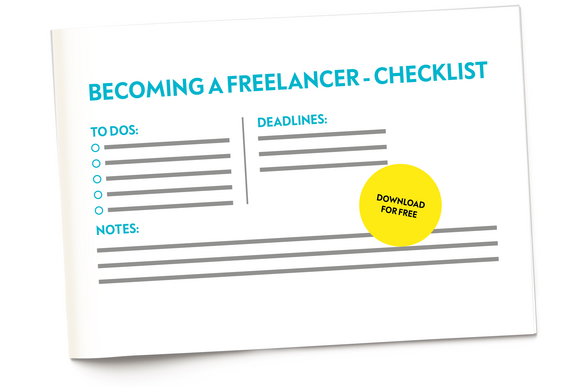
Becoming a freelancer: registration, tips & checklist
Table of contents
Jump here to your topics
- Definition: what is a freelancer?
- In which sectors can you work as a freelancer?
- What are the advantages and disadvantages of being a freelancer?
- Essential requirements for your freelance career
- Becoming a freelancer—12-step guide
- Becoming a freelancer: downloadable checklist
- Work as a freelancer now: resources to help you succeed
Becoming a freelancer: what you need to know in a nutshell
What is a freelancer?
Being a freelancer means that you work independently for various companies or on projects. You are not a permanent employee and this means that you are not bound by instructions or required to make social security contributions.
In which sectors can I work as a freelancer?
You can work as a freelancer in any sector in which independent workers are hired and provided that it is possible to work from anywhere. Freelancing is particularly popular in digital professions, such as those in IT or marketing. However, freelancers are also in demand in consultancy and administration roles.
How do I become a freelancer?
To become a freelancer, you need to determine a sector for your activity, provide expertise, and meet business and legal requirements. Initial steps include:
- Determining your level of self-employment (full-time or part-time)
- Preparing a freelance proposal
- Calculating your hourly rate and running costs
- Registering your business
- Taking out insurance policies
- Making tax arrangements
- Acquiring clients
Definition: what is a freelancer?
As a freelancer, you work independently for various companies and on various projects, either remotely or on-site. Your assignments are governed by a work or service contract which sets out your remuneration and service period. As a freelancer, you are not bound by instructions unlike permanent employees. You are also not required to make social security contributions and must take out your own insurance policies.

Handy tip:
Self-employed people may work on a freelance basis, but not all freelancers are self-employed because freelancing refers to the type of employment relationship, whereas self-employment refers to the activity itself. Self-employment is defined in the German Income Tax Act. Lawyers, doctors and architects are examples of professions in which self-employment is possible.
In which sectors can you work as a freelancer?
As a freelancer, you can work in any sector in which assignments are given to independent workers. However, there are certain sectors in which work is carried out by freelancers particularly frequently. These sectors include:
- IT
- Media
- Marketing and advertising
- Consultancy
- Coaching
- Artistic activities
A common thread running through popular sectors is that they enable projects to be carried out regardless of the worker's location and with a degree of flexibility.
IT: Freelancers are highly sought after in IT
Whether or not freelancers are in extreme demand in a given sector also depends on the growing shortage of skilled workers. This is especially true for IT, a sector which is currently the largest source of freelance employment, a situation which is also unlikely to change in the future. A study carried out by the digital association, bitkom, revealed that there were 96,000 job vacancies in the German IT sector in late 2021. That represents a 12 per cent rise compared to figures for the previous year.
Digital professions popular for freelancers right now
There is also a growing disparity between the number of job vacancies and applicants in other digital professions such as marketing or project management jobs.
Find your next freelance project now
You can also find exciting projects in particularly popular sectors on our Freelance Project Portal.
What are the advantages and disadvantages of being a freelancer?
Working as a freelancer has advantages over a permanent job but also some disadvantages.
Advantages of being a freelancer
The advantages of being an independent freelancer include:
- Flexible working hours
- Diverse projects
- Working on your own terms
- Ability to select assignments that suit you
- Further professional development
- Financial perks: especially in sectors in which freelancers are in great demand
Disadvantages of being a freelancer
- Business risk—no regular income
- Clients must be acquired independently
- Business admin
- No paid leave, protection against dismissal or insurance cover

Watch out for ostensible self-employment
Another risk posed by freelancing is that your supposedly self-employed activity may be assessed as being "ostensible self-employment" by your pension insurance organisation, for example, where you may be classified as "gainfully employed" despite appearing to be self-employed to the outside world. If an audit is carried out and establishes the existence of ostensible self-employment, you will be required to pay backdated contributions to statutory health, pension, nursing care and unemployment insurance schemes. Information about the criteria for ostensible self-employment is available at haufe.de (German).
In short, be smart and counteract the negatives
Working as a freelancer mainly offers you freedom, the chance to earn more, and a greater sense of personal fulfilment. On the other hand, the business risk is greater and you become solely responsible for accounting, organization and other business administration tasks. The good news is that, with the right planning in place , you can counteract the perceived negative aspects of freelancing.
Essential requirements for your freelance career
Before venturing into the world of freelancing, you should check whether you have everything you need. This includes:
- Specialist expertise
- Necessary references
- A sector-specific network
- A suitable workplace
- Savings to fall back on when getting started
Although there is no universal recommendation as to how much sector-specific expertise and work experience you must possess to have a shot at making it as a freelancer, it's always the case that the more experienced you are, the more interesting potential clients will find your services. Consequently, this means you can charge a higher hourly rate. If you have minimal experience, it is even more important that you keep learning, gain a lot of expertise—especially when you start out—and take on different assignments, including assignments that may even be less lucrative.

Are you unsure how to most effectively update your references and successfully pitch your portfolio? Our experts will advise you and provide guidance during your transition to freelance working. Create your freelance profile now.
Becoming a freelancer – 12-step guide
Do you consider freelancing to offer more pros than cons and do you feel ready to make the jump? If so, start your freelance career now! Our 12-step guide will help you get started.
1. Find the sector in which you wish to work freelance
The sector in which you intend to work as a freelancer is usually the one that matches your education or previous employment. Alternatively, you can undergo training and pursue work in a different, specific, sector. Irrespective of whether or not your chosen sector is desperately seeking skilled workers, your first step in freelancing should always be to consider your unique selling proposition. The following questions will be of help:
- What can I do really well?
- What do I care about and what is my passion?
- How do potential clients benefit if they work with me?
- What sets me apart from the competition?
2. Analyse the market
Your success as a freelance worker depends on your competition. When you start your freelance career, take enough time to analyse the assignments currently available and your potential competitors:
- Who is my target group and how large is this group?
- What trends are evident in my sector and how can I exploit these?
- Who is my competition and what do my competitors offer?
- What can I do better than them?
3. Determine your level of self-employment
Do you want to become completely self-employed or do you want to freelance while holding a permanent job? Trying out self-employment while holding another job may be a wise choice, especially at the beginning. We reveal how to set up your own business while continuing to work at your salaried job and what you need to keep in mind in our magazine article "Setting up for part-time self-employment: everything you need to know about self-employed working, registration, taxes etc." (in German).
4. Prepare a proposal
Prepare a proposal and an initial business plan for you and your target group. This should incorporate your findings from the competitive analysis and your goals.
- Do you want to work as a generalist or as a specialist?
- Who are your potential clients?
- What are your values?
5. Plan your finances
You won't succeed as a freelancer if you have miscalculated your budget, no matter how much expertise you have. So take enough time at the start to plan your finances. This includes:
- Determining running costs (taxes, work materials etc.)
- Planning your hourly rate
- Determining how much profit you need to generate in order to make a living
- Estimating your peak output and how much income this would generate
- Estimating your minimum output and how much income this would generate (if you were taken ill, for example)
Tip: prepare your financial plan for a first month and a whole year on a trial basis.
6. Register your freelance business
Things get serious once your proposal and financial plan are in place. You can register your business or freelance activity. This requires you to first decide on a suitable legal structure. For example, a sole proprietorship with unlimited liability would be a good choice for purely freelance activity carried out as an individual, i.e. without any employees. Since this is a non-commercial sole proprietorship, you can simply register your freelance activity with the tax office. However, you must register a business with the business licensing office if you have founded it.

7. Set up your workplace
Whether a home office, co-working space or an extra office—set up a practical and presentable workplace. This should include:
- A strong Internet connection
- Telephone availability
- All necessary work equipment (PC, printer etc.)
Before you start, consider how you would prefer to be contacted, for example via an extra business phone.
8. Establish an entrepreneurial profile
For most freelancers, your online profile is your business card. Make use of the following channels:
- Your own website with references, contact details, CV
- Select business-focused social media networks (Facebook, Xing, LinkedIn)
- Freelance platforms
Design your website and online profiles in such a way that potential clients can navigate them easily. This ensures that they can quickly find any key information about your services and how to contact you.
9. Insurance, pension and tax – arrangements, planning and setting money aside
Are you planning to become a freelancer without taking out insurance or filing tax returns etc.? Unfortunately, that is just not possible. You still need to take out the right insurance and make pension plan and tax arrangements before acquiring your first clients. Unlike a salaried employee, you are not automatically insured as a freelancer. The following insurance is important:
- Health insurance (statutory or private)
- Accident insurance
- Old-age pension insurance
- Professional insurance
- Occupational disability insurance
- Public liability insurance
- Intellectual property rights-related protection
- Business contents insurance
As a freelancer, you will be required to pay income tax, trade tax and VAT. Since taxes can be a headache, it would be helpful to get professional advice when you start out and before you file your first tax return.
In addition to insurance and tax, your pension plan arrangements represent a third important point to consider if you work as a freelancer. As a freelancer, you are not obliged to pay state-run pension insurance (as of 2022) and must make old-age pension fund contributions privately. Several options are available for this, such as:
- Making voluntary contributions to the statutory pension fund
- Paying into a private pension insurance scheme
- Investing in securities, property etc.
10. Find clients and carry out projects
Once you have set up your workplace, established your corporate profile and resolved any business challenges, it's time to find the right projects and clients. Develop a strategy and determine which channels you intend to use to acquire clients, such as:
- Project portals
- Your website
- Social media
Tip: freelance project portals give you a good overview of available projects in your sector. You will find a variety of currently available projects in a range of sectors on our AVANTGARDE EXPERTS project portal.
Did you manage to land your first assignments? Congratulations! Now you need to manage them properly. This management can include:
- Negotiating your fee
- Setting and meeting deadlines
- Preparing invoices
11. Networks
As a freelancer, you should be exchanging ideas with like-minded people and not just actively looking for new projects. A solid network of freelancers can open doors to new projects that may not have been posted publicly. A network will also teach you more about the work routine of a freelancer and give you helpful tips. In our magazine, we share 7 tips on how to build your professional network with successful business networking (German). We are also providing you with a networking platform to meet new people and gain fascinating insights. Drop by at the next Experts Talk (German).
12. Build up reserves and manage crises
Last but not least, you should prepare for crises and challenges. This means:
- Building up reserves
- Developing plans to manage crisis situations, such as an illness or family emergency
- Scheduling days off (holidays, for example)

Becoming a freelancer: downloadable checklist
Your freelance career is now ready to start. But have you thought of everything? Run through our freelance checklist now and give yourself an overview.
Download our freelance checklist now.
- Find and define the sector in which you wish to work freelance
- Analyse the assignments and the competition
- Determine your level of self-employment (full-time or part-time)
- Prepare a freelance proposal
- Plan your finances (hourly rate, running costs)
- Register your business
- Set up your workplace
- Create an entrepreneurial profile
- Take out insurance policies
- Plan old-age pension provisions and invest money
- Make tax arrangements and set money aside
- Acquire clients (find and carry out initial projects)
- Networks
- Build up savings
- Plan for crises and manage them successfully

Work as a freelancer now: resources to help you succeed
To succeed as a freelancer, you must be prepared to constantly learn, network and gain greater expertise. You can benefit from special training courses, such as those offered by the IBB professional education institute (German), especially when you start out as a freelancer. These will give you commercial knowledge. As your freelance career progresses, you can attend regular professional training sessions and conferences.
Stay up to date with the latest news and trends in freelancing. You will discover articles in the Freelancing category (mainly German) of our magazine which will help you in your daily freelancing, such as:
- Find and gain customers: It's that simple (German)
- Digital nomads: work from anywhere (German)
- Interviews with three successful freelance marketers (German)
Last but not least: Get career guidance!
The AVANTGARDE EXPERTS freelance recruitment service will help you find assignments and pitches your portfolio to potential new clients. Click here to find your next dream project.
We have thoroughly researched the information included here and it has been reproduced to the best of our knowledge. However, we cannot accept any liability for the completeness and accuracy of this information. We expressly recommend that you seek advice from the Chamber of Industry and Commerce, the relevant authorities (tax office, business licensing office) or authorised lawyers and tax consultants where an individual case requires the provision of such advice.

